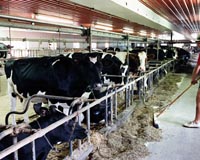 |
Grand Forks ND (SPX) Dec 21, 2009 The Energy and Environmental Research Center (EERC) Foundation and Whole Energy Fuels, headquartered in Bellingham, Washington, are poised to commercialize a novel and groundbreaking cellulosic biofuel technology developed at the EERC at the University of North Dakota. Whole Energy is receiving global, exclusive licensing rights to EERC Foundation's technology, which converts biomass and other recycled material into liquid biofuels. Utilizing cellulosic materials to produce biofuels has several advantages. Cellulosic materials such as wood, grasses, or the nonedible parts of crops, including wheat straw, soybean hulls, and corn cobs, are vast and diverse feedstocks compared to first-generation feedstocks like corn starch or sugarcane. In addition, cellulosic fuels promise to become the lowest-cost biofuel while at the same time provide large reductions in greenhouse gas emissions compared to petroleum-derived fuels. "This project presents an exciting opportunity for the EERC, as it is one of the very first involving production of advanced fuel additives from cellulosic feedstocks," said Senior Research Advisor Ed Olson. "This technology will ultimately be used to improve engine performance using a renewable product, both in gasoline and diesel engines. In the case of diesel fuel, our additives will boost the cetane levels, improve flow properties and, most importantly, reduce particulate emissions." The current federal Renewable Fuel Standard requires that 36 million gallons of biofuels must be used in transportation fuel by 2022, including at least 21 billion gallons of advanced biofuels such as cellulosic biofuels. This creates a gigantic market for cellulosic biofuels. Atul Deshmane, CEO and President of Whole Energy, is excited to capture this market opportunity and build on over 15 years' experience in the alternative fuels industry. "Partnering with the EERC and obtaining a technology license from the EERC Foundation will jump-start Mercurius Biofuels, a new company formed with our help to develop and commercialize advanced biofuel technologies," said Mr. Deshmane. "Mercurius is developing the technology with the intent of building and operating a pilot plant to demonstrate what may be the most energy- and carbon-efficient process for making a cellulosic fuel." Karl Seck, President of Mercurius Biofuels, is looking forward to building a successful company with the EERC Foundation's technology as its centerpiece. "The EERC Foundation's biorefinery technology is superior to other technologies because it does not depend on enzymes, fermentation, or extreme operating conditions," said Mr. Seck. Based on experience in the petroleum refining industry, he continues, "This technology is more in line with the petroleum refining model and will benefit from many of the same efficiencies." "The EERC is internationally recognized for its applied energy and environmental research programs, which translate to a never-ending stream of commercialization opportunities for our partners," said EERC Director Gerald Groenewold. "Working with Whole Energy and Mercurius Biofuels is another testimony to the success of the EERC's business model." Share This Article With Planet Earth
Related Links Energy and Environmental Research Center (EERC) Foundation Bio Fuel Technology and Application News
 Renewable Energy From Manure Becomes Reality For NY
Renewable Energy From Manure Becomes Reality For NYRosemont IL (SPX) Dec 21, 2009 Methane digesters on dairy farms could soon be a common source of energy for residents and businesses in the state of New York. That is one result of the Dairy Power Summit which brought together more than 200 New York dairy farmers and industry stakeholders from across the country to discuss the potential for dairy-supplied renewable energy. Summit attendees set a 2020 goal that 40 ... read more |
|
| The content herein, unless otherwise known to be public domain, are Copyright 1995-2009 - SpaceDaily. AFP and UPI Wire Stories are copyright Agence France-Presse and United Press International. ESA Portal Reports are copyright European Space Agency. All NASA sourced material is public domain. Additional copyrights may apply in whole or part to other bona fide parties. Advertising does not imply endorsement,agreement or approval of any opinions, statements or information provided by SpaceDaily on any Web page published or hosted by SpaceDaily. Privacy Statement |